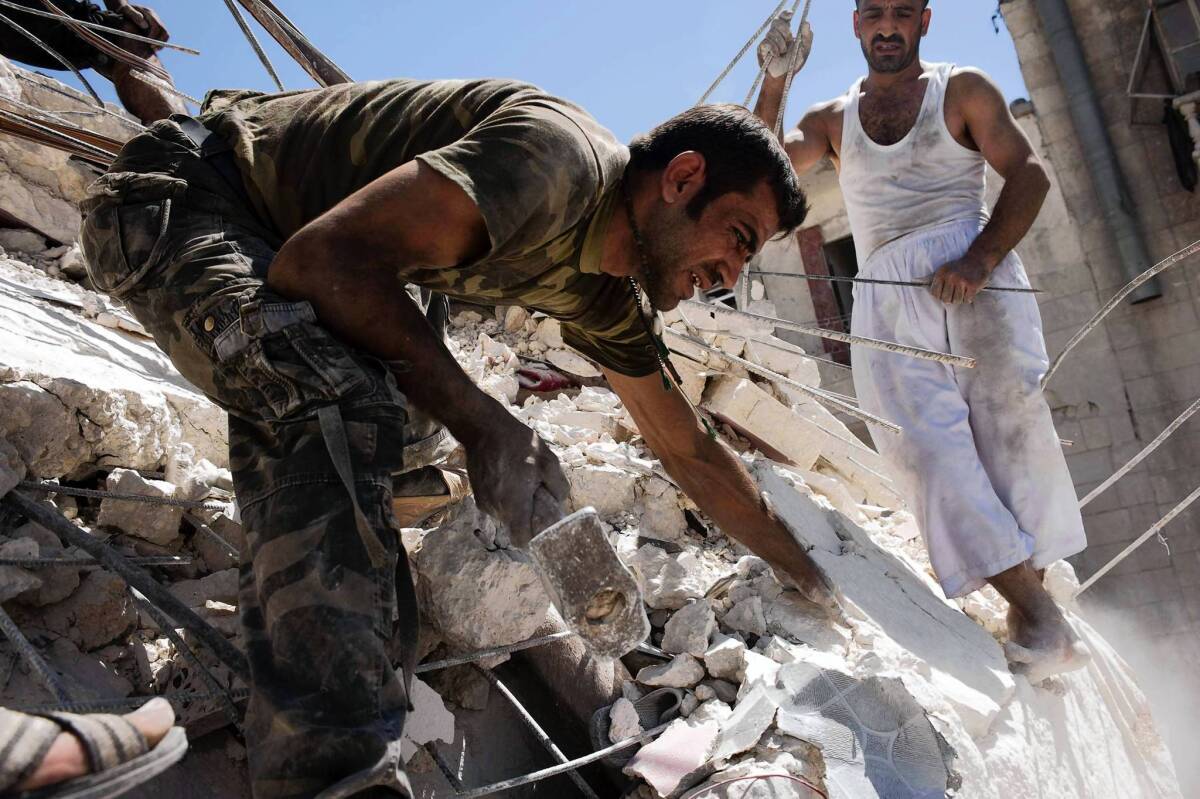Syria forces continue to attack rebels in Damascus, Aleppo

- Share via
BEIRUT — Syrian forces on Thursday renewed attacks against rebel strongholds in the nation’s two largest cities, highlighting the determination of President Bashar Assad’s government to crush resistance in Damascus and the northern city of Aleppo.
For a second consecutive day, opposition activists said, the military used mortars and airstrikes in Daraya, a suburb south of Damascus, the capital.
“They are shelling it at an insane pace,” said Moaz Shami, a Damascus-based activist.
About two dozen civilians have been killed in the area, the opposition said. As is often the case in Syria, there was no independent corroboration of the fighting or death toll.
The reported onslaught appears to be part of a government effort to root out insurgents and sympathizers throughout the greater Damascus area. The government has already swept through many city districts in a bid to crush rebels who rose up there last month.
The rebel offensive in the capital raised the specter that it could fall into rebel hands, or at least veer largely out of government control, but Assad’s security forces appear to have beaten back rebel forces.
Opposition forces in Damascus and elsewhere say they have not been vanquished in a rebellion that has now extended to much of the country, posing a challenge for a military that has suffered major casualties and many defections.
Although the recent focus has been on Damascus and Aleppo, fierce clashes continue in the central city of Homs. The eastern city of Dair Alzour remains a battleground, as are parts of the southern province of Dara, where the uprising began more than 17 months ago.
The reported military push Thursday in the Damascus suburbs came a day after the government stormed several pro-opposition neighborhoods, including the Kfar Souseh district, where, the opposition said, security forces executed several dozen people, the latest in a string of alleged mass executions.
The allegations could not be independently verified. The government has accused the opposition of fabricating reports of massacres to garner international support for the rebellion.
More than 200 miles north of the capital, fighting continued in Aleppo. Four weeks ago, rebel forces from outside the city occupied several neighborhoods, vowing to seize the nation’s commercial hub. Some envisioned Aleppo becoming a rebel haven and capital, just as Benghazi in Libya became the unofficial rebel capital last year during the revolt in that country.
But, as in Damascus, the rebel offensive in Aleppo has met stiff resistance from government troops, who have a distinct advantage in firepower compared with rebels armed mostly with rifles, rocket-propelled grenades and homemade bombs. Strikes by helicopter gunships and jet fighters have now become a regular feature of the government counter-assault in Aleppo.
An opposition activist in Aleppo, who goes by the name Abu Hisham, denied reports Thursday that rebels had withdrawn from several of the Christian neighborhoods, where many residents are wary of the rebellion.
“The Free Syrian Army hasn’t withdrawn from any neighborhoods,” Abu Hisham said, using the name for the rebel umbrella group. “Today, as always, there was regular mortar fire and airplane strikes.”
Tens of thousands of people have fled Aleppo, many heading to nearby Turkey. Others have sought shelter in districts away from the fighting. Aid groups have voiced concern about a possible humanitarian catastrophe in the city as the fighting turns residential districts into rubble-strewn combat zones.
Amnesty International said in a report Thursday that civilians in Aleppo were “enduring a horrific level of violence.”
Among other incidents, the report documented how some civilians were killed and injured while waiting in line for bread, a precious commodity in the besieged city. The report said the government and the rebels were using imprecise weapons that posed a grave danger to civilians.
Times staff contributed to this report.
More to Read
Sign up for Essential California
The most important California stories and recommendations in your inbox every morning.
You may occasionally receive promotional content from the Los Angeles Times.










